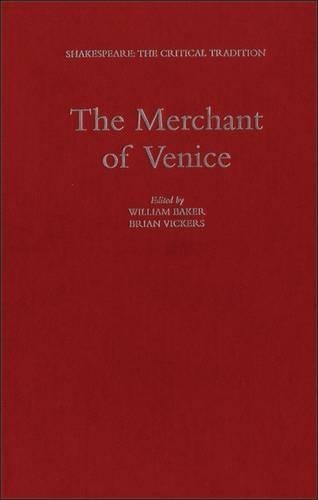
The Merchant of Venice: Shakespeare: The Critical Tradition
(Hardback)
Available Formats
Publishing Details
The Merchant of Venice: Shakespeare: The Critical Tradition
By (Author) William Baker
Edited by Professor Brian Vickers
Bloomsbury Publishing PLC
Continuum International Publishing Group Ltd.
1st March 2005
United Kingdom
Classifications
Tertiary Education
Non Fiction
822.33
Physical Properties
Hardback
480
Width 156mm, Height 234mm
880g
Description
The Merchant of Venice has always been regarded as one of Shakespeare's most interesting plays. Before the nineteenth century critical reaction is relatively fragmentary. However between then and the late twentieth century the critical tradition reveals the tremendous vitality of the play to evoke emotion in the theatre and in the study. Since the middle of the twentieth century reactions to the drama have been influenced by the Nazi destruction of European Jewry. The first volume to document the full tradition of criticism of The Merchant of Venice includes an extensive introduction which charts the reactions to the play up to the beginning of the twenty first century and reflects changing reactions to prejudice in this period. Material by a variety of critics appears here for the first time since initial publication. Reactions are included from: Malone, Hazlitt, Jameson, Heine, Knight, Lewes, Halliwell-Phillips, Furnivall, Irving, Ruskin, Swinburne, Masefield, Gollancz and Quiller-Couch.
Reviews
"'Shakespeare, the Critical Tradition' is an immensely useful and important series. As Vickers states, scholarship is in danger of losing the criticism of the previous 150 years because of the amount of modern criticism and the rejection of previous schools of criticism. By bringing together scholarly and performance-based essays from 1775 to 1939, Baker and Vickers assure that this will not happen to the rich and varied history of The Merchant of Venice, and their choices are uniformly excellent...Summing up: Recommended. Lower-division undergraduates through faculty; general readers." - Choice, March 2006 * Choice *
"Shakespeare, the Critical Tradition" is an immensely useful and important series. As Vickers states, scholarship is in danger of losing the criticism of the previous 150 years because of the amount of modern criticism and the rejection of previous schools of criticism. By bringing together scholarly and performance-based essays from 1775 to 1939, Baker and Vickers assure that this will not happen to the rich and varied history of The Merchant of Venice, and their choices are uniformly excellent. However, this reviewer was quite disappointed with Vickers's preface, which is strongly biased. In a collection such as this, works should be allowed to stand on their own. Vickers instead argues openly and strenuously not only for reading Shylock as a comic villain but also for the claim that one does great damage to the play and to Shakespeare by attempting any other reading. This presumes a specific view of Shakespeare, plays, and characters in general, and a point of criticism with which many readers will not agree. The strident preface may stop some from discovering the riches contained in the rest of the volume. Summing Up: Recommended. Lower-division undergraduates through faculty; general readers." -- A Castaldo, Widener University * Choice Reviews.online *
Author Bio
William Baker is Trustee Professor, Distinguished Research Professor, Department of English and University Libraries, at Northern Illinois University, USA. He is the author/editor of numerous books and his co-authored Harold Pinter: A Bibliographical History and his The Letters of Wilkie Collins were honoured by Choice as the year's most outstanding books (2006 and 2000). WILLIAM BAKER is Professor, Department of English, and Professor, University Libraries, at Northern Illinois University. His previous books include Recent Work in Critical Theory, 1989-1995: An Annotated Bibliography (1996), Twentieth-Century Bibliography and Textual Criticism: An Annotated Bibliography (2000), and A Companion to the Victorian Novel (2002), all available from Greenwood Press. He also coedited The Letters of Wilkie Collins (1999), and has been awarded a National Endowment for the Humanities Fellowship for 2002-2003 to edit another three volumes of Wilkie Collins's letters. Brian Vickers is a Fellow of the British Academy and a Distinguished Senior Fellow in The School of Advanced Study, University of London.
